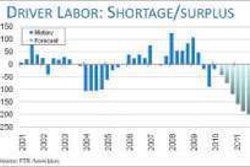Lessons learned

Since the recession’s official beginnings in 2007, large and small truckload carriers have cut employment by 12 percent and 18 percent, respectively. Less-than-truckload carriers have trimmed payroll by 14 percent. Last year, load count dropped nearly 25 percent and truck utilization fell by 15 percent from peak 2007 levels, according to the American Trucking Associations.
After all the bloodletting the industry has endured, by most indications the economy is on the road to recovery. Truck capacity is tightening, and rates are inching their way back up. Fleet executives are beginning to breathe a sigh of relief, and some, believe it or not, are grateful for the experience.
“I would say the recession is the best thing that ever happened to us because it woke us up,” says Richard Stocking, president and chief operating officer of Swift Transportation. “We were asleep at the wheel.”
Stocking joined a panel of shippers and fleet executives last month at the Transplace Shipper Symposium in Phoenix. Panel members shared the lessons they learned from the recession and their present focus in the post-recession economy.
Like other carriers, the recession forced Swift to apply discipline to every process in the organization, starting with the order-to-cash cycle. “We looked at the value stream and saw waste everywhere,” Stocking says. One of the most important changes to take place at Swift was as much cultural as managerial. Swift became “hyper-focused” on what is “wildly important” to the company, he says.
Before the recession, “we were very slow in making changes and turns,” Stocking says. During the recession, management began using more lead measures in its operations versus lag measures based on P&L statements. “Now we’ve gone all the way upstream and really focused on the lead measure that affects that wildly important goal.”
“Predictions are difficult — especially about the future.” –Yogi Berra
Each one of the lead measures Swift uses is “score-carded” according to employees’ circle of influence. “They know in three seconds or less if they are winning or losing,” Stocking says. “Then we have this cadence of accountability toward those goals. It’s a weekly cadence to keep us focused.”
Employee morale tends to suffer under the intense scrutiny and painful steps fleet executives and managers must take during a recession. Stocking realized that employees must understand the mission, vision and focus of the organization. To improve morale during tough times, leaders must inspire trust by clarifying roles and getting people to offer their best.
“Inspiring trust is a foundation that I don’t want our people to forget,” Stocking says. “We have to have trust in our organizations with people and with customers. You inspire trust by producing results and with character and competence.”
Going forward, building and maintaining trust with customers is just as critical, even though some – if not most – sought rate reductions during the recession. In a post-recession economy, the formula for earning trust is the same as it always has been. First, give customers a variety of options, including different modes of transport, to meet their cost and service requirements. Build trust by producing the promised results, Stocking says.
If nothing else, the last two years have shown that the only thing certain about the future is its uncertainty. Supply and demand are fickle. Contracts and relationships with customers will turn quickly based on the dynamics of the market. Fuel prices will be more volatile than ever. Changes in technology and government policy happening now could lead to untold and dramatic changes in the future.
Panel members agreed that because of all this uncertainty, businesses must plan for volatility by maintaining as much flexibility as possible; they must be able to both expand and contract in a matter of weeks.
“We don’t want to forget the lessons learned during this tough time,” Stocking says. n
Aaron Huff is Senior Editor of Commercial Carrier Journal. E-mail [email protected] or call (801) 754-4296.












